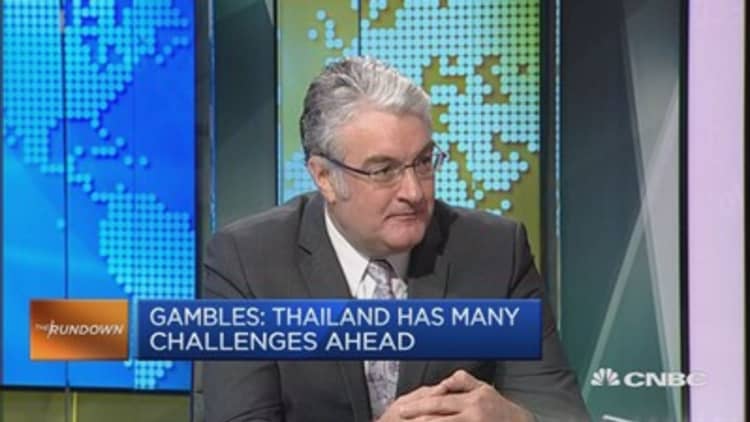Thailand's history of military coups has made policymakers too focused on political stability rather than foreign investment, according to a panel of experts.
At the CNBC Exchange during the 14th Asia Business Leaders Awards in Bangkok on Wednesday, issues like transparency remained major sticking points for investors hesitant to place their bets on Southeast Asia's second-largest economy.
Foreign direct investment (FDI) in Thailand's economy remains weak due to structural weaknesses likes high labor costs, availability of labor supply, and a lax regulatory environment.
"Thailand requires an attitude change. It has such great underlying strength, but areas like rule of law and corruption remain major hurdles," said Curtis Chin, former U.S. ambassador to the Asian Development Bank and Asia Fellow at the Milken Institute.
"All this is very obvious, but the country is so involved in its political situation that they're not addressing it."
In May 2014, after more than seven months of political protests against the democratically-elected government, Thailand's army chief, General Prayuth Chan-ocha, declared the military had seized power and later installed himself as prime minister, marking the 19th coup d'etat since 1932.
The timeline for a return to democratic elections has been pushed back repeatedly. Deputy Prime Minister Wissanu Krea-ngam most recently announced that a general election will be held by May 2017, according to local media.

The World Bank's latest survey on the ease of doing business, released on Wednesday, reflected Chin's views. The country, known as the "land of smiles" for its hospitality and friendly citizens, ranked 49th out of the 189 countries covered by the survey, down three spots from last year, and was eclipsed by frontier markets like Macedonia and the Slovak Republic.
But Kesara Manchusree, President of Thailand's Stock Exchange, pointed out that citizen's perceptions of the current government are actually quite positive due to their efforts to get rid of corruption and increase accountability.
Indeed, experts like the Anti-Corruption Organization of Thailand point to the army's creation of an agency in charge of monitoring state-owned enterprises, and the Centre for National Anti-Corruption (CNAC) as proof. Meanwhile, Privy Council President General Prem Tinsulanonda proposed a fresh vow to fight graft earlier this month.
"I challenge the thought that all Thai people welcome what is happening in this country. There is broad disagreement (on corruption), especially looking at Transparency International's (TI) data," said Chin.
Last year, the rice-producing nation ranked 85th in TI's 2014 Corruption Perceptions Index rankings. However, Thailand doesn't necessarily need to fix its volatile politics in order to tackle corruption.
Thailand's outlook is more geared towards externally-sourced capital, as opposed to domestic, due to a shrinking pool of investment savings as a result of aging demographics, explained Michael Kurtz, global head of equity strategy at Nomura.
"They have to focus on creating an environment welcome for foreign direct investment. Investors want stability, visibility, transparency. If they can achieve the latter through a non-democratic government, that's not a negative scenario."
—CNBC's Leslie Shaffer contributed to this report.






